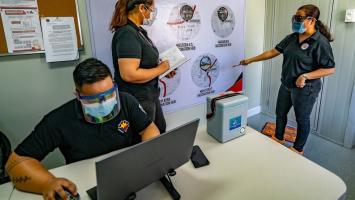How Universities Can Spearhead the Net-Zero Revolution

General Manager, Monash Energy Institute

Senior Project Manager (Cities), Climateworks Centre

Universities are equipped with engaged staff and students who are dedicated to combating climate change. Photo credit: iStock/PrathanChorruangsak.
Universities can demonstrate crucial leadership in the global race toward net zero as well as serve as living labs that can test solutions at scale.
This article is published in collaboration with the Climateworks Centre.
Universities’ vast campus infrastructures and large populations of students, staff and commercial tenants can make them seem like miniature cities.
And, like cities, these campuses contribute significantly to greenhouse gas emissions.
However, universities are well-positioned to demonstrate crucial leadership in the global race toward net zero.
Unlike most city precincts, where assets are owned and operated by different parties, universities generally have control of their campus environment.
This gives them the ability to transform into net-zero precincts at speed.
They can demonstrate community leadership, innovate scalable solutions, and address long-term financial and environmental risks.
And they are also uniquely positioned to convene and form partnerships across research, industry, and public institutions that amplify climate action.
Universities are also equipped with engaged staff and students who are dedicated to combating climate change.
Reducing emissions on campus
There is a range of initiatives universities can undertake on campus to reduce emissions, including:
- Developing campus microgrids and adopting renewable energy sources;
- Promoting sustainable commuting, switching to zero-emission vehicles, and encouraging eco-friendly business travel;
- Retrofitting campus buildings to be more energy-efficient by upgrading HVAC, lighting, and other energy consuming appliances;
- Embracing circular economy principles and implementing material recovery initiatives;
- Adopting sustainable procurement practices and influencing emission reduction from suppliers;
- Serving as change agents, engaging with student bodies, and fostering net-zero-aligned education, research, and innovation.
Universities can act as living labs, testing solutions at scale within campus precincts. These solutions can then be deployed more widely by amplifying success stories, driving knowledge, and translating research to successfully replicate initiatives within our cities.
Universities must also prioritize developing advanced curricula on decarbonization solutions.
Collaboration is critical
To overcome common barriers to implementation, net-zero initiatives can be advanced through collaboration across industry and research.
Universities can leverage their research capabilities to develop and deploy cutting-edge technologies and solutions.
By sharing lessons from their implementation of on-campus decarbonization initiatives, universities can equip students, community, and industry partners with the skills and knowledge necessary for replicating these successes.
Sharing best practices, resources, and tools allows universities at the forefront of climate action to support those who are just beginning to decarbonize their campuses and cities.
Supporting net-zero universities
More than 1,000 universities worldwide have joined the United Nations Race to Zero campaign to decarbonize their campuses.
However, each institution will embark on a unique path to net zero.
What has been lacking until recently is the ability to bring universities together to share best practices, resources, and tools so that pioneers in the area can assist those beginning their decarbonization journey.
To this end, the United Nations Sustainable Development Solutions Network (SDSN), in collaboration with Monash University’s Climateworks Centre and Monash Energy Institute, has published a Net Zero on Campus guide and online toolkit comprising case studies and resources.
These resources detail a range of campus initiatives to reduce emissions across energy, transport and mobility, buildings and facilities, waste management, and value chains through specific actions such as those outlined above.
Additionally, SDSN is fostering a vibrant community of practice, supporting more than 1,000 universities worldwide in aligning their campuses with net-zero principles and technologies.
This network highlights the urgency of pooling resources for knowledge-building and the potential for universities to lead in decarbonization efforts.
The guide, online toolkit, and global community of practice through this initiative will provide invaluable support to universities and colleges worldwide.
These resources empower educational institutions to accelerate decarbonizing their operations and leverage their strengths as global change agents during this critical decade of action.
This article was first published by Climateworks Centre on 21 April 2023.

Shreejan Pandey
General Manager, Monash Energy InstituteShreejan Pandey is responsible for the Monash Energy Institute's operations and for developing multidisciplinary programs and partnerships that accelerate sustainable energy transitions and emissions reductions. With a background in power systems engineering and more than 15 years of experience in the energy and research sectors, he has contributed significantly to flagship renewable energy deployment projects and research initiatives. His interests include energy systems and energy policy.

Rebecca Powell
Senior Project Manager (Cities), Climateworks CentreRebecca Powell manages the cities and infrastructure program in the Cities team. She provides a range of project management, research, policy analysis, and advice to internal and external stakeholders, supporting decarbonization across cities and the built environment. She works closely with the Transport team where she manages the team’s technical modelling capability and supports stakeholder engagement and policy research to drive decarbonization across the transport sector, with a focus on aligning city and climate outcomes.

Climateworks Centre
Climateworks Centre bridges the gap between research and climate action, operating as an independent not-for-profit within Monash University. Climateworks Centre develops specialist knowledge to accelerate emissions reduction, in line with the global 1.5°C temperature goal, across Australia, Southeast Asia and the Pacific.

